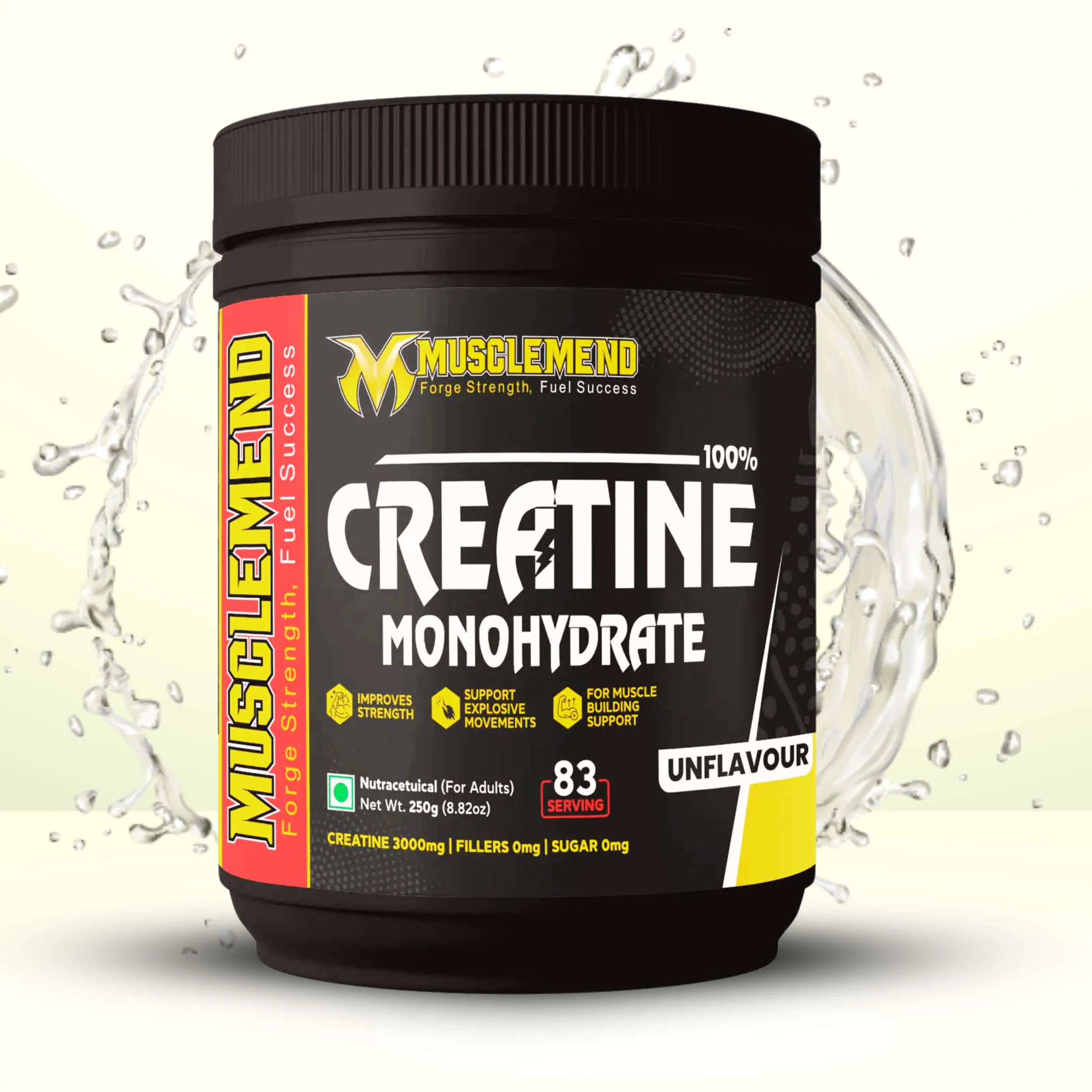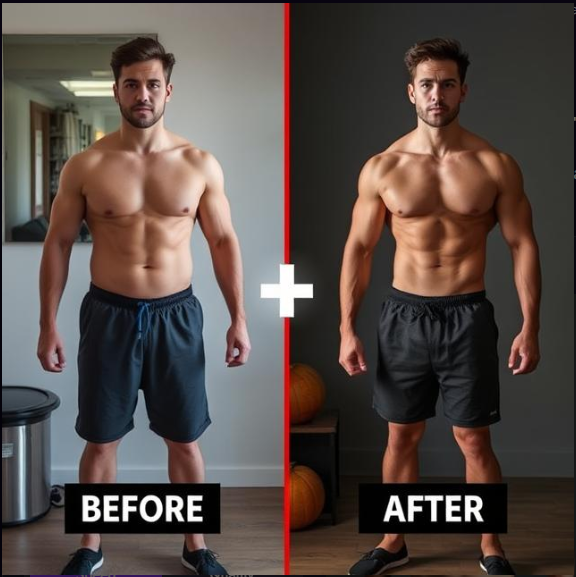How MuscleMend Creatine Support Boosts Muscle, Strength & Recovery — 100% Research backed
and even cognitive function, you’ve probably encountered creatine. But with so much conflicting information
online, it’s tough to separate fact from fiction. Let’s dive deep into the science behind MuscleMend’s 100%
Creatine Monohydrate and discover why this particular supplement has become the gold standard for athletes,
fitness enthusiasts, and health-conscious individuals worldwide.

The Bottom Line Up Front: Research consistently shows that creatine monohydrate is one of the
most effective, safe, and well-studied supplements available. MuscleMend’s pure, HPLC-tested formula delivers
3000mg of premium micronized creatine monohydrate per serving—exactly what your muscles need to push beyond
their limits and achieve peak performance.
Understanding Creatine: The Cellular Energy Powerhouse
What Exactly Is Creatine?
Creatine is far from being an artificial substance—it’s a naturally occurring compound that your body produces
every day. Your liver, kidneys, and pancreas manufacture about 1-2 grams of creatine daily from three amino
acids: arginine, glycine, and methionine[2]. You also consume creatine
naturally through foods like red meat, fish, and poultry.
But here’s where it gets interesting: your muscles can only store limited amounts of creatine. When you’re
pushing through those final reps or sprinting that last 100 meters, your muscles desperately need rapid energy.
This is where creatine supplementation becomes a game-changer.
The Science Behind Energy Production
Inside your muscle cells, creatine gets converted into phosphocreatine (PCr), which serves as an immediate energy
reservoir. During high-intensity exercise, your muscles break down adenosine triphosphate (ATP)—the body’s
primary energy currency. However, ATP stores are depleted within seconds of intense activity[3].
This is where phosphocreatine saves the day. It rapidly donates its phosphate group to regenerate ATP, giving
your muscles the fuel they need to continue performing at peak intensity. Think of it as having a backup battery
that kicks in instantly when your main power source runs low.
The Research Revolution: Why Creatine Monohydrate Reigns Supreme
Decades of Scientific Validation
The International Society of Sports Nutrition has analyzed over 1,000 studies on creatine and concluded that it’s
“the most effective ergogenic nutritional supplement currently available to athletes in terms of
increasing high-intensity exercise capacity and lean body mass during training”[8]. This isn’t marketing hype—it’s scientific consensus backed by decades of rigorous
research.
What makes these findings even more compelling is that nearly all these studies used the same form that
MuscleMend provides: creatine monohydrate. While supplement companies have developed various “advanced” forms of
creatine, none have consistently outperformed the original[27].
Proven Performance Benefits
Research demonstrates that creatine supplementation typically produces:
- 10-20% improvement in various high-intensity exercise tasks[8]
- 5-15% increase in strength and power output[12]
- Enhanced muscle recovery between sets and training sessions[8]
- Increased lean muscle mass when combined with resistance training[3]
These aren’t marginal gains—they’re significant improvements that can transform your training results. A recent
meta-analysis involving 509 participants found that creatine supplementation combined with resistance training
significantly increased both upper-body strength (4.43 kg improvement) and lower-body strength (11.35 kg
improvement) compared to placebo groups[6].
Beyond the Gym: Creatine’s Surprising Cognitive Benefits
Brain Power Enhancement
One of the most exciting areas of creatine research involves its impact on cognitive function. Your brain,
despite representing only 2% of your body weight, consumes about 20% of your daily energy. Just like muscles,
brain cells rely on ATP for energy, making creatine supplementation potentially beneficial for mental
performance.
A comprehensive meta-analysis of 16 randomized controlled trials involving 492 participants found that creatine
supplementation significantly improved:
- Memory performance (effect size: 0.31)[14]
- Processing speed (effect size: -0.51)[14]
- Attention time (effect size: -0.31)[14]
Cognitive Protection and Enhancement
Recent research suggests creatine may be particularly beneficial for older adults and individuals under cognitive
stress. A study involving sleep-deprived participants found that a single high dose of creatine (0.35 g/kg body
weight) improved cognitive performance and processing speed while preventing the typical drop in brain pH levels
associated with fatigue[5].
Even more intriguingly, preliminary research at the University of Kansas Medical Center suggests creatine
supplementation may help improve working memory and executive function in patients with Alzheimer’s disease[19]. While this research is still in early stages, it highlights
creatine’s potential as a neuroprotective compound.
Safety First: Debunking Common Creatine Myths
The Kidney Damage Myth
Perhaps no myth about creatine is more persistent—or more thoroughly debunked—than the claim that it damages
kidneys. This misconception stems from the fact that creatine supplementation can slightly increase blood
creatinine levels (a waste product of creatine metabolism). However, elevated creatinine doesn’t indicate kidney
damage in healthy individuals—it simply reflects increased creatine processing.
The evidence is overwhelmingly clear: numerous studies spanning up to five years have found no adverse
effects on kidney function in healthy individuals taking recommended doses of creatine[15][18]. In fact, one study
monitoring Division 1 NCAA football players found that those using creatine actually experienced fewer injuries,
including less dehydration and heat-related illness, compared to non-users[18].
The Hair Loss Fiction
Another persistent myth suggests that creatine causes hair loss. This stems from a single 2009 study involving
college rugby players that showed a slight increase in DHT (dihydrotestosterone) levels. However, no
subsequent research has replicated these findings, and no studies have ever demonstrated actual hair loss
from creatine use[25][31].
As cardiovascular surgeon Dr. Jeremy London explains, “There’s no solid evidence creatine directly causes
baldness. Hair loss is usually genetic—it runs in families. If you were going to lose your hair, creatine isn’t
the culprit”[31].
The Weight Gain Reality
Yes, creatine typically causes a 1-2 kg increase in body weight within the first week of supplementation. But
before you panic, understand what’s actually happening: this weight gain comes from increased water
retention within muscle cells, not fat accumulation[28].
This intracellular water increase is actually beneficial—it creates an anabolic environment that promotes protein
synthesis and muscle growth. Your muscles appear fuller and more defined, not bloated or puffy. This is lean
tissue growth, not unwanted weight gain.
Optimizing Your Creatine Strategy: Loading vs. Maintenance
The Traditional Loading Phase
The classic creatine protocol involves a loading phase: 20-25 grams daily (divided into 4-5 servings) for 5-7
days, followed by a maintenance dose of 3-5 grams daily[16]. This approach
saturates your muscles’ creatine stores quickly, potentially providing benefits within a week.
The Steady-State Alternative
However, recent research shows that you don’t need to load creatine to achieve the same long-term
benefits[13]. Taking 3-5 grams daily from the start will
achieve the same muscle saturation—it just takes 3-4 weeks instead of one week. This approach may reduce the
risk of digestive discomfort that some people experience during loading.
MuscleMend makes both approaches easy with their precisely dosed 3-gram servings. Whether you choose to load or
take the steady approach, you’re getting the exact amount of pure creatine monohydrate that research shows to be
most effective.
Timing: Does It Matter?
Contrary to popular belief, the timing of creatine consumption isn’t crucial for its
effectiveness. Unlike pre-workout supplements that need precise timing, creatine works by gradually
saturating your muscle stores. Whether you take it pre-workout, post-workout, or with breakfast, the key is
consistent daily consumption[4].
That said, some research suggests taking creatine with carbohydrates may enhance uptake by about 25% due to
insulin’s effect on creatine transport[10]. This makes MuscleMend’s
unflavored option perfect for mixing with your favorite carbohydrate-containing beverage.
Why MuscleMend’s Formula Stands Above the Competition
Purity You Can Trust
MuscleMend’s creatine monohydrate undergoes rigorous HPLC testing to ensure 99%+ purity. This isn’t just a
marketing claim—it’s a quality assurance measure that guarantees you’re getting exactly what’s on the label.
Lower-quality creatine products may contain impurities that can cause digestive issues or reduce effectiveness.
Micronization for Superior Mixing
The micronization process reduces creatine particle size, making it dissolve more easily in liquids. This isn’t
just about convenience—better solubility may improve absorption and reduce the gritty texture that puts many
people off cheaper creatine products.
No Unnecessary Additives
MuscleMend’s formula contains zero fillers, sugars, or artificial ingredients. You’re getting pure creatine
monohydrate and nothing else. This clean approach aligns with the research, which consistently shows that simple
creatine monohydrate outperforms more complex formulations[27].
Third-Party Testing and Quality Assurance
MuscleMend’s commitment to quality includes third-party testing and GMP (Good Manufacturing Practice)
certification. The company uses USA-sourced ingredients and ensures no banned substances are present—crucial for
competitive athletes subject to drug testing.
Real-World Results: What Users Experience
Performance Improvements
MuscleMend users consistently report experiencing the benefits that research predicts:
- Increased strength and power output
- Better muscular endurance during high-intensity training
- Faster recovery between sets
- Enhanced muscle fullness and definition
- Improved training volume capacity
These aren’t placebo effects—they’re the natural result of optimized cellular energy systems.
Cognitive Benefits
While less commonly discussed, many users notice improved mental clarity and focus. This aligns with the growing
research on creatine’s cognitive benefits, particularly during times of stress or sleep deprivation.
Special Populations: Who Benefits Most?
Athletes and Fitness Enthusiasts
The most obvious beneficiaries are individuals engaged in high-intensity, short-duration activities. This
includes:
- Weight lifters and powerlifters
- Sprinters and track athletes
- Team sport players (football, basketball, soccer)
- CrossFit and functional fitness athletes
- Bodybuilders focusing on muscle growth
Older Adults
Research suggests creatine may be particularly beneficial for aging individuals. A study following older adults
found that those supplementing with creatine experienced:
- Better preservation of muscle mass
- Improved strength gains from resistance training
- Enhanced bone density in the lower legs[3]
Vegetarians and Vegans
Since creatine is primarily found in animal products, vegetarians and vegans typically have lower baseline
creatine levels. Research shows these individuals often experience more pronounced benefits from
supplementation, particularly in cognitive tasks[21].
Women
Despite persistent myths suggesting otherwise, women receive the same performance and muscle-building
benefits from creatine as men. Recent research indicates women may be even more responsive to
creatine’s cognitive benefits[14].
The Growing Market and Future of Creatine
The global creatine supplements market, valued at $1.11 billion in 2024, is projected to reach $4.21 billion by
2030—a staggering 25.2% annual growth rate[29]. This isn’t driven by
marketing hype; it’s fueled by mounting scientific evidence and real-world results.
This growth reflects a broader shift toward evidence-based supplementation. As consumers become more educated
about nutrition science, they’re gravitating toward supplements with robust research support. Creatine
monohydrate represents the gold standard of this approach.
Practical Implementation: Getting Started with MuscleMend
For Beginners
If you’re new to creatine:
- Start with the maintenance approach: 3 grams daily
- Mix with 120ml of water or your preferred beverage
- Take consistently every day, regardless of training schedule
- Stay well-hydrated throughout the day
- Be patient—full benefits typically develop over 2-4 weeks
For Experienced Users
If you want faster results:
- Consider a 5-7 day loading phase with 15-20 grams daily (5 servings of MuscleMend’s 3-gram dose)
- Divide doses throughout the day to minimize digestive upset
- Follow with maintenance dosing of 3-5 grams daily
- Monitor your response and adjust as needed
Combining with Other Supplements
MuscleMend’s pure formula stacks perfectly with:
- Whey protein for enhanced muscle growth
- BCAAs or EAAs for improved recovery
- Pre-workout supplements (take creatine separately from high-caffeine products)
- Post-workout carbohydrates for enhanced uptake
The Economic Advantage
At ₹199-₹399 depending on size, MuscleMend offers exceptional value. When you calculate cost per gram of pure,
tested creatine monohydrate, it’s significantly more economical than fancy “advanced” formulations that often
cost 2-3 times more without providing additional benefits.
Quality Assurance and Safety
MuscleMend’s commitment to quality extends beyond the product itself:
- HPLC testing for purity verification
- USA-sourced ingredients meeting pharmaceutical standards
- GMP certification ensuring consistent manufacturing processes
- Third-party testing for banned substances and contaminants
- Gluten-free formulation suitable for those with sensitivities
Conclusion: The Smart Choice for Evidence-Based Performance
In a supplement industry filled with overhyped products and questionable claims, MuscleMend’s 100% Creatine
Monohydrate represents something refreshing: a product backed by genuine science, manufactured to pharmaceutical
standards, and priced fairly.
The research is unambiguous—creatine monohydrate is one of the few supplements that consistently delivers
measurable performance improvements. Whether you’re an athlete chasing peak performance, a fitness enthusiast
looking to maximize your training, or someone interested in the cognitive benefits, MuscleMend provides the
pure, potent creatine your body needs.
The choice is simple: you can either continue training with your natural creatine stores operating at partial
capacity, or you can optimize your cellular energy systems with one of the most thoroughly researched
supplements ever developed. With MuscleMend’s quality assurance, competitive pricing, and proven formula,
there’s never been a better time to experience the transformative power of creatine supplementation.
Ready to unlock your potential? Your muscles—and your mind—are waiting for the energy boost that
only quality creatine monohydrate can provide.
References
Health and Disease.” https://pmc.ncbi.nlm.nih.gov/articles/PMC7910963/
Supplementation for Muscle Growth: A Scoping Review.” https://pmc.ncbi.nlm.nih.gov/articles/PMC8949037/
Timing of Ingestion Really Influence Muscle Creatine Uptake?” https://www.frontiersin.org/journals/sports-and-active-living/articles/10.3389/fspor.2022.893714/full
cognitive performance and induces changes in cerebral high energy phosphates.” https://www.nature.com/articles/s41598-024-54249-9
Training on Muscle Strength.” https://pubmed.ncbi.nlm.nih.gov/39519498/
supplementation with specific view to exercise/sports performance.” https://pmc.ncbi.nlm.nih.gov/articles/PMC3407788/
Creatine Supplementation around Exercise: A Real Concern?” https://pmc.ncbi.nlm.nih.gov/articles/PMC8401986/


